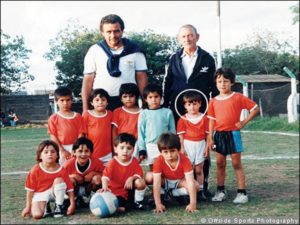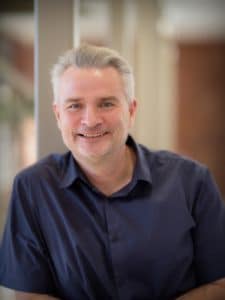Dr. Mark Williams part of Evening Lecture series return
Published 3.30.22
Can you spot the future superstar soccer player in this crowd?

If your choice is anyone other than short, slight boy on the second row, second from the right, bad news: You missed Lionel Messi.
Dr. Mark Williams, Senior Research Scientist at IHMC, has made it his business to learn what makes an elite athlete like Messi the best. His March 2022 talk as part of the IHMC’s popular Evening Lecture Series shared some of the common traits of the greats. The Evening Lecture Series has returned to both the Pensacola and Ocala IHMC campuses. To keep up with the latest schedule of talks, visit https://www.ihmc.us/life/evening_lectures/
Environment, birth order, adaptations, learning, and practice are all factors that build sports expertise, Williams said.

Dr. Mark Williams
So, too, is there room for science to explore the psychological and cognitive differences sports experts possess when compared to sub-experts in their field, Williams said.
For example, as soccer players in the Premier League Academy system age up, game intelligence skills become more key than the strictly physical gifts that can set them apart from their peers early on.
Elite athletes have some common psychological characteristics. They:
- Pick up more visual cues from their opponents’ bodies. That’s because their hours of practice have created a rich library of cues and scenarios about what might happen next.
- Have superior pattern recognition.
- Have more effective visual search behaviors. That’s reflected in something called the “Quiet Eye” phenomenon. That’s the period of final visual fixation before the performance of the final phase of movement — when it really counts, what your eye lasers in on before you commit the physical movement.
- Have greater robustness under pressure (fixate centrally and use peripheral vision to gather info).
What also begins to matter more is what Williams calls, the psychology of excellence. Skills like motivation, mental toughness, perfectionism, resilience, and coping become crucial components for an expert, he says.
And while yes, the popular notion that it takes 10,000 hours of practice — at least — to be great at something has scientific merit, expertise is also developed by how those hours are spent. Experts, Williams shared, avoid arrested development by engaging in deliberate practice: Practice with a purpose.
Experts devote more time to practicing weaker skills, exhibit more self-reflection, use more physical and mental effort during practice, and may find practice less enjoyable.
Understanding how expertise is built can improve coaching and teaching strategies.
The challenge of coaching, for example, is “what’s the least amount feedback the learner needs to sustain change in performance?” Williams says. “To infer that learning takes place, I have to see that change in performance contributes to future practices.”
What we learn about how expertise develops in sports can have implications for other fields, including the military, law enforcement, hospital emergency departments, and aviation, William says, all fields where expertise, developed in an often high-stress environment, can mean the difference between a life-or-death outcome.
To learn more about Dr. Mark Williams’ work, check out his book “The Best: How Elite Athletes Are Made.”
IHMC is a not-for-profit research institute of the Florida University System where researchers pioneer science and technologies aimed at leveraging and extending human capabilities. For more information, visit ihmc.us.
Latest News
- David Bear joins IHMC Board of Directors
- STEM-Talk: Michael Schmidt on building a space-faring civilization
- Florida Blue award supports health and wellness research and outreach at IHMC
- STEM-Talk: Ken Forbus on AI and his development of the Structure Mapping Engine
- STEM-Talk: Pascal Lee on returning to the Moon — and heading to Mars
- Aging Symposium draws experts to IHMC
- IHMC hosts Fredric G. Levin Lung Care Symposium March 27-28 in Pensacola
- Humanoid robotics and exoskeletons lead latest IHMC newsletter
- Celebrate Robotics Week at IHMC Open House on April 11, 2025

